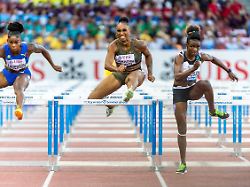GDR records long since pulverized
Sprinters consider fabulous times to be achievable
06/27/2023, 6:50 p.m
In East Berlin in 1969, the first woman to break the 13-second mark in the 100-meter hurdle. 54 years later, the fastest female sprinters are approaching the 11 before the comma. World champion and Olympic champion agree: This sound barrier is ready to be broken.
Nigerian world record holder Tobi Amusan and Olympic gold medalist Jasmine Camacho-Quinn from Puerto Rico believe that the first woman to sprint in a 100-meter hurdle in under 12 seconds is only a matter of time. “Nothing is impossible. Eleven seconds? Definitely,” said Amusan before the Golden Spike Sports Festival in Ostrava, Czech Republic. Camacho-Quinn, who came third in the World Championships, also believes that breaking the sound barrier is realistic. “It’s possible and I hope it happens in our time,” said the 26-year-old.
Since Amusan’s semi-final victory at the World Championships last year in Eugene, Oregon, the world record has stood at 12.12 seconds. In the final, the 26-year-old even ran six hundredths of a second faster to the title, although the tailwind was above the permitted limit.
As the first woman under the then “magic mark” of 13.0 seconds, the GDR athlete Karin Balzer from Magdeburg was more than half a century ago in July 1969 in East Berlin in a hand-timed 12.9 seconds. Balzer’s team colleague Annelie Ehrhardt from Hötensleben set the first world record in the age of electronic timekeeping in 1972 at the Olympic premiere of the hurdle sprint in Munich when she won the gold medal in 12.59 seconds. The former GDR athlete Bettine Jahn (then Karl-Marx-Stadt/today Chemnitz) has held the German record of 12.42 seconds since June 1983.
In Ostrava, both Amusan and Camacho-Quinn also spoke out against the increase in the current 84 centimeter high hurdles, which was discussed among experts. “I don’t see any point in pushing the hurdles higher. What do people expect from that? They would just watch us keep jumping up. It’s about fine-tuning the rhythm of speed and technique,” said Camacho- Quinn made her point and received support from her rival Amusan: “Don’t raise the bar.”
